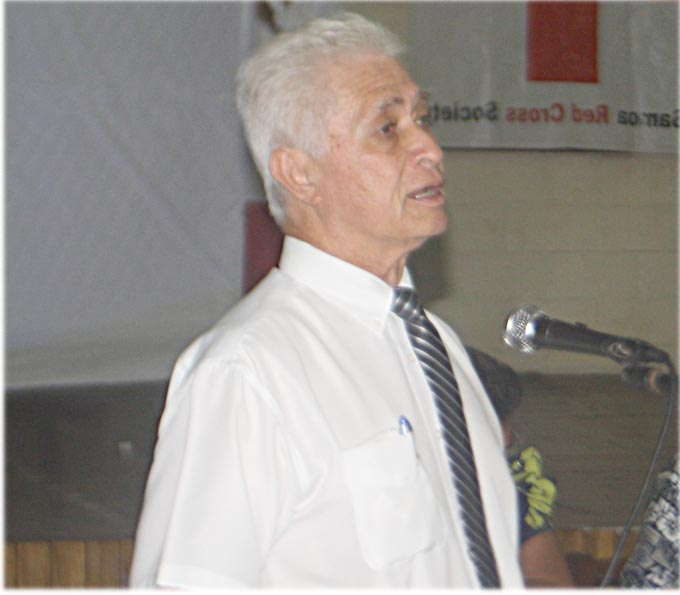Ombudsman and Human Rights Commissioner, Maiava Iulai Toma
By Staff Writer
Ombudsman and Human Rights Commissioner, Maiava Iulai Toma, is assured that fundamental rights of an individual are fully protected under the Constitution of Samoa.
But he is also convinced of the crucial role by the ‘Village Fono’ in the life, wellbeing and national security of Samoa.
He did respond to these key points in the ongoing Constitutional changes debate that the individual rights will always win over the collective rights in court.
Newsline Samoa put the question to him about the chances of establishing legal harmony between the competing rights.
Maiava responded with a written response reprinted here in full :
The National Human Rights Institute of Samoa is not in the business of engaging in the public debating of points of law. We leave that to the appropriate entities in the legal fraternity. Occasionally, we comment on the law and the Constitution from the perspective of human rights.
We make the point that it is normal for modern constitutions to include a “Bill of Rights” declaring fundamental freedoms that the State will guarantee to its citizens. This part of the Constitution, in effect, sets a floor of reasonableness and human decency, below which the State undertakes not to allow its society to sink. The Samoan Constitution guarantees fundamental freedoms such as the right to life, right to personal liberty, freedom of speech, freedom from inhuman treatment, freedom of religion, etc.
The Constitution does not allow these freedoms to be violated by any authority in Samoa, be it a village Fono in its actions and decisions, or and especially, the Government itself.
The question is, are we so certain that the Village Fono will never act with ill or improper will towards anyone that we want to exempt it and its decisions from these constitutional safeguards?
NHRI Samoa acknowledges unreservedly, that the place and role of the “Village Fono” in the life, national security, and wellbeing of Samoa is of such crucial importance that precipitous undermining of its standing and authority in the villages must be avoided at all cost. It is an indictment of us who belong to this country that a significant element of this has been allowed to happen for such a long time now. To be clear, the cause of this injury to ourselves cannot be foisted upon the existence of individual rights in Samoa nor upon the Constitution by which the country is governed.
It is easy to see that, with only one notable exception, the constitutional Bill of Rights has not been a problem for the village fono, in the proper exercise of its traditional role. For instance, the Supreme Court in the 1995 Taamale case (In re the Constitution, Taamale v Attorney-General [1995] WSCA 1; 02 1995B (18 August 1995) upheld a Village Fono decision to banish a family from their village. The Court considered the banishment at that time, a reasonable restriction, imposed by existing law (that is custom and usage), in the interests of public order, on the exercise of the right of freedom of movement. The village fono can hardly be said to be always TKOed by individual rights in the Supreme Court.
It is with regard to encounters with the individual’s freedom of religion that the Supreme Court has routinely declared ‘TKO’ victories against Village Fono who have had the misfortune of stepping into the ring for the encounter. Sadly, these TKOs, dating back several decades, were declared in circumstances where the full potential of the law as allowed by the Constitution in the matter, had not been thoroughly explored.
The Constitution clearly allows reasonable restriction upon the exercise or the manifesting of an individual’s religious freedom (Article 11 (2)) as it does also for freedom of speech, assembly, association, movement, and residence (Article 13 (2-4)) for important reasons including national security or public order. These restrictions can be put in place either through existing laws (this includes any custom or usage which has acquired the force of law in Samoa as in the case of banishment mentioned in the case of Taamale) or by establishing new laws or by way of a decision or judgment of a competent Court.
This dimension of the constitutional provision specifically on the individual’s religious freedom does not appear to have been an area of interest to the Court, either to exhaustively delve into on its own accord or to alert the Government to the possibility of legislative action in the face of desperate efforts by Fono to explain their side of the story.
Giving weight or recognition in law to the actions of Fono and customary practice in general, can only be done in one of two ways. By judgment of a Court of competent jurisdiction such as the Supreme Court or by Act of Parliament.
The Samoan Supreme Court regularly takes Fono punishment into account in mitigation and in the case of Marina Ututa’alega v Luefatasaga Iulio and others (Unreported) in 1987 it declared that: … “The custom [banishment] has acquired the force of law” [but that] … “Such an order [of banishment] must be supported by adequate evidence that banishment is warranted to preserve peace and harmony.” As far as we know the Supreme Court has not ventured beyond this into any other area of customary practice in its judgments. Parliament, on the other hand, has legitimized actions of the Fono in the Village Fono Act 1990 but has not passed any legislation specifically to impose reasonable restriction(s) on the exercise of religious freedom in villages under Article 11(2) of the Constitution. This latter, in our view, will fix belatedly, the only problem (portrayed as intractable) we have ever experienced with individual rights in the villages since independence.
